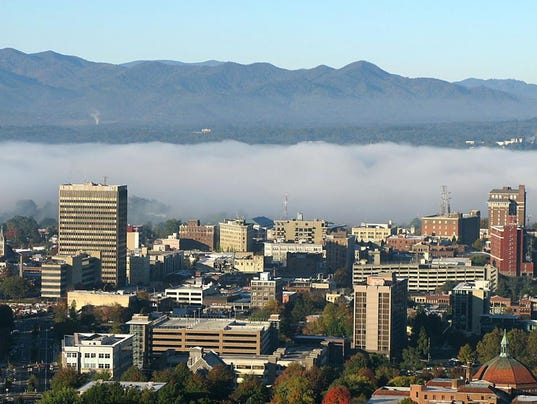
ASHEVILLE — Two of the nation’s leading economists said the U.S. is on track for its longest period of economic expansion in history, despite residual seasonality slowing real gross domestic product growth in the first quarter of the year.
David Berson and James Smith delivered rosy forecasts for the national economy during the 34th annual Economic Crystal Ball Seminar at UNC Asheville’s Lipinsky Auditorium on Thursday. Both predicted the ongoing economic expansion, which began in 2009, will pass the decade mark next year. It likely will surpass the decade-long expansion that ran from 1991-2001, for the longest such period of economic growth in U.S. history.
Berson said he’s expecting the nation’s real GDP growth, an indicator about the health of the economy, to be around 3 percent this year, numbers the U.S. hasn’t regularly seen since before its last recession began in 2007.
MORE:
► Despite sustained GDP growth in US, some cities still hit hard by extreme poverty
► USA Today Editorial: Trump’s economy looks a lot like Obama’s
► Why good environmental policy is good business, too
As for when the next recession could happen, don’t expect it anytime soon, he said.
“Typically, when you get an inverted yield curve, a recession happens about a year and half afterwards,” he said, adding if it inverted tomorrow, “it would probably be at least a year before the economy went into a recession and perhaps even two years.”
The event is a yearly showcase for Berson, senior vice president and chief economist for Nationwide Mutual, and Smith, chief economist at Asheville-based Parsec Financial Inc. This year’s presentation topic was, “The U.S. Economy Keeps Sailing Along,” a fitting title after Friday’s job’s announcement from the Bureau of Labor Statistics.
The bureau said Friday the economy added 164,000 jobs in April, and the unemployment rate fell to 3.9 percent. It marked the lowest jobless rate recorded since 2000 after holding firm at 4.1 percent for much of the past six months.
Asheville’s Metropolitan Statistical Area, which encompasses Buncombe, Haywood, Henderson, Transylvania, and Madison counties, recorded the state’s lowest unemployment rate in March at 3.5 percent. It also added 1,000 jobs, the majority of which are in the leisure and hospitality industries.
Smith said the economy — and particularly, the job market — is “in a situation that is pretty much as good as it gets.” His crystal ball report indicates jobs are “likely to remain plentiful and easy to get for a long time to come,” and especially for college graduates.
“If you have a kid or grandkid graduating college this year, more power to you,” he said. “That young person is going into a labor market that was only matched in 1945, 1973 and 1999. It is an amazing job market for a trained person.”
One topic of discussion Thursday was the effects the Trump administration has had on the economy. In the time since the last Economic Crystal Ball Seminar, President Donald Trump appointed Jerome Powell as chairman of the Federal Reserve, replacing Janet Yellen; he signed the Tax Cuts and Jobs Act of 2017; and he’s sought to roll back regulations on banking and trade.
Both Berson and Smith predict the Fed under Powell’s direction will raise interest rates four times this year. Berson said the Fed is “trying to give themselves some dry powder so they have room to lower it later.”
“Eventually inflation will move high enough and the Fed will have tightened enough that short-term rates will move above long-term rates,” Berson said, noting it is a factor often leading to an inverted yield curve. The yield curve measures the spread between short- and long-term rates.
Smith said the U.S. has seen 17 inverted yield curves that have lasted four months or longer since 1901, each of them followed within two years by an economic recession.
He urged people to pay attention to the yield curve, as it remains the surest signal of when the next recession may occur.
“Is it 2020? Is it 2021? Who knows?” he said. “Whenever the yield curve inverts, bad times are coming. But not this year, not next year and not the year after.
“At least the next three crystal ball seminars should be really nice parties.”
[“Source-citizen-times”]




